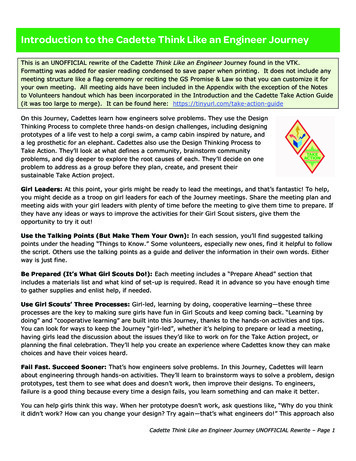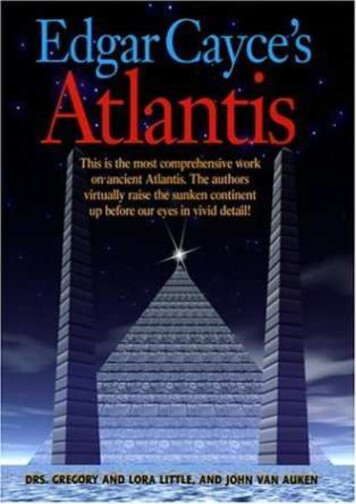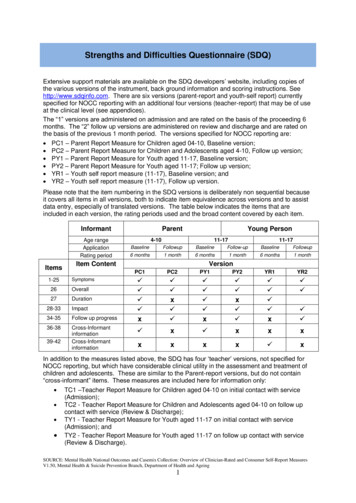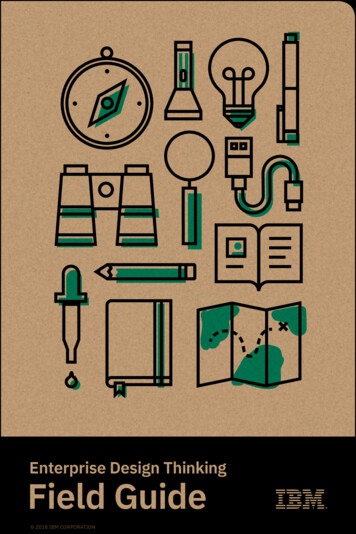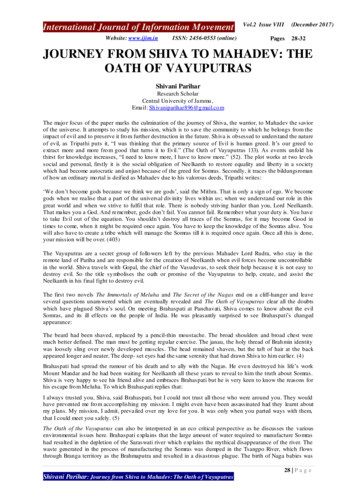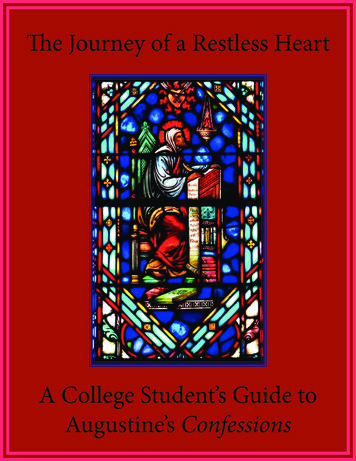
Transcription
The Journey of a Restless HeartA College Student’s Guide toAugustine’s Confessions1
The Journey of a Restless HeartA College Student’s Guide toAugustine’s Confessions“You have made us for yourselves,O God, and our hearts are restlessuntil they rest in You.”—Confessions, 1.1.1
The Journey of a Restless Heart—A College Student’s Guide to Augustine’s ConfessionsAuthored by Students of the Honors Interdisciplinary Humanities Seminar, Villanova University, Fall 2013Copyright info:This work is licensed under a Creative Commons AttributionShare Alike 3.0 United States License ).The illustrations are from the stained glass windows depicting the life of St. Augustine, in the St. Thomas ofVillanova Church on the campus of Villanova University.Cover: St. Augustine writing confessions
The Journey of a Restless HeartA College Student’s Guide toAugustine’s Confessions
ContentsThe Journey of a Restless Heart—A College Student’s Guide to St. Augustine’s Confessions7Infancy8A Youthful Crime: Stealing Pears9Reading Cicero’s Hortensius11Death of a Friend12The Problem of Evil13Conversion in the Garden: Tolle Lege15Baptism16Augustine’s Mother: Monica17Experiences with Death19Life After Conversion20Authors and Acknowledgements226
The Journey of a Restless Heart—A College Student’s Guide to St. Augustine’s ConfessionsWritten for College Students, by College StudentsWelcome to our web resource on St. Augustine’s Confessions. We’ve listed a few questions you may be asking yourself.Who was St. Augustine?Augustine was born in North Africa in 354, converted to Christianity in 387, became a prominent bishop andauthor in the Roman Empire, and died in 430. His work is enormously influential in Western thinking, and histheology is foundational to both Catholicism and Protestantism. Confessions, his spiritual autobiography, is hismost important work.What can I learn from this site and how is it different from other resources about Augustine’s Confessions?What this resource is not:What it is:What. thissiteisnot:What. . a scholarly discussion of Augustine.it. .is:written by college students, for college. . . a scholarly discussion of Augustine. . . writtenbytocollegestudents,for collegestudentshelp youunderstandsome of Austudentsto helpyou understandof Au-to thegustine’sthoughtsand how somethey relategustine’sthoughtsofandhow theyrelate to day. . . a biography or a book only about Augus. . . a discussion of eight incidents from Augus. . . a tine’sbiography. . . atine’sdiscussioneighttoincidentsfromideasor a book only about Auguslife asofa wayintroduceyouAugusto his lifetine’s ideastine’sandlife someas a wayto introduceof histhoughts you to his lifeof his thoughts. . . a religious book designed to convince youand some. . . a presentationof Augustine’s life and. . . a thatreligiousbook designedtovalid.convince you. . . a thoughtpresentationof s arein a waythat will helpthat Augustine’s ideas are valid.thoughtin a waywillabouthelp themyou understandhis ideasandthatthinkfor yourself.his ideas and think about them for yourself.Who constructed this resource?This resource was written by the students of the Interdisciplinary Honors Seminar at Villanova University.We are a group of academic and curious students who take six classes together during freshman year andtwo more during sophomore year. We are team-taught by teachers from varying disciplines. Our enrichingenvironment, academic resources, and supportive community provide us with a unique and comprehensiveopportunity to explore the classics of Western Civilization. This resource fulfills an assignment for the fallsemester of our freshman year.This project allowed us to delve further into our discussion of St. Augustine’s theology and philosophy, and torelate that understanding in a way that suited a specific audience. We hope that by providing summaries of theimportant events in Augustine’s life, analyses of these incidents, and comparisons to modern society, we can forma connection between a man who walked the earth nearly two thousand years ago and college students today.Can I use this resource when I am writing a paper about Augustine?Yes and no. Reading this resource will really help you understand Augustine, but please be careful in how youuse our material. First, this isn’t a scholarly source. We are freshman students, so don’t cite us as though weare experts! Above all, be sure to cite our work properly, using the correct format for Internet sources. Justremember, if you use any of our quotations from Augustine, be sure to cite it as coming from this source,rather than making it appear that you are taking it from the book that we used. Check out what Yale Universitysays about quoting from books you haven’t seen yourself here. Here would be a sample citation:Augustine said he was “in love with loving” [qtd. in Villanova Honors Students, p. xx].In your works cited page, you would list this text, using the standard format for Internet sources, listing“Villanova Honors Students” as the authors.What text did we use?Quotations are taken from St. Augustine, The Confessions, translated by Maria Boulding, O.S. B. Hyde Park,New York: New City Press, 1997. Some of the quotations have been slightly altered to improve readability.7
Infancy“This is the way of infants”(Conf. 3.6.8)St. Augustine starts his Confessions (which is really long speech directed to God) by describing his life as a baby.Right away, that tells us something about what kind of book this is. He obviously doesn’t really know anythingabout his thoughts or actions as a baby (he wrote this long after both parents died), but he uses his account tomake a bigger point. We see this move over and over again in Confessions, when Augustine describes events– which may or may not have happened exactly as he says – in ways that are shaped to make a broader pointabout God and our own lives. Thus Augustine’s discussions of his early life aren’t really about what was goingon in his crib in 354; they’re about bigger themes: why our lives are sometimes so restless and unsatisfying,and what we need to do to find peace of mind.The storyAt first, Augustine describes his infancy in glowing terms, that remind us of the Garden of Eden, the paradisein Genesis. Just as Adam and Eve are provided with everything they could need and want, the baby Augustinestarts his life in a divinely created paradise. He has exactly what he needs, when he needs it, and the personwho is nurturing him is happy to do so.I was welcomed by the tender care your mercy provided for me. . . The comforts of human milk werewaiting for me, but my mother and my nurses did not fill their own breasts; rather you gave me an infant’snourishment through them in accordance with your plan, from the riches deeply hidden in creation. Yourestrained me from craving more than you provided, and inspired in those who nurtured me the will to giveme what you were giving them, for their love for me was patterned on your law and so they wanted to passon to me the overflowing gift they received from you. It was a bounty for them, and a bounty for me fromthem; or, rather, not from them, but only through them, for in truth all good things are from you, O God(1.6.7).This is how Adam and Eve were created, in a perfectly balanced world with all of their needs met.Very soon, however, Augustine describes a different world. This new world isn’t like Eden, but very muchlike our own. It is a world of competition where people want what they can’t have; a world of frustration,manipulation, anger, and power. Now the baby is frustrated because other people don’t understand him,and he wants things that aren’t good for him (maybe he wants to stay up late). So he takes his revenge oneveryone in the household, making them as miserable as he is.Little by little I began to notice where I was, and I would try to make my wishes known to those who mightsatisfy them; but I was frustrated in this, because my desires were inside me, while other people were outsideand could by no effort of understanding enter my mind. So I tossed about and screamed, sending signalsmeant to indicate what I wanted, those few signs that were the best I could manage, though they did notreally express my desires. Often I did not get my way, either because people did not understand or becausewhat I demanded might have harmed me (1.6.8).To heighten the comparison to the Bible, Augustine also alludes to the Bible’s first murder, when Cain killsAbel out of jealousy: “I have watched and experienced for myself the jealousy of a small child: he could noteven speak, yet he glared with livid fury at his fellow-nursling” (1.7.11). We sometimes speak of babies as“innocent.” For Augustine, however, babies are only innocent because they are too weak to do anything bad.“The minds of babies are far from innocent” (1.7.12).What is the point?Augustine gives us a clue to the meaning of this story (and almost every other story in Confessions) in the firstparagraph of Confessions, when he says, “You have made us for yourself, O God, and our hearts are restless until8
they rest in you” (1.1.1). If you take this sentence apart, you’ll see that Augustine is telling us a lot about what itmeans to be human. What he says is that God created us to live in a peaceful and bountiful world, where wehad everything we need. But for some reason (we’ll hear a lot more about this in later chapters), we, like Adamand Eve, aren’t in that world any more. Today we live in a world that is hard and hard on us. And the biggestcost is that we are restless, and constantly searching for happiness, but often looking for it in the wrong place.And we will never really be happy until we find our way back to a closer relationship with God.The story of the babies isn’t about Augustine as an infant. It is really the state of our current restless lives andthe only cure for that restlessness, which is to somehow find our way back to the world for which we wereoriginally created.What does this mean for our own lives?What do you think? Are most of us restless all the time? Look around you. Do most people seem happy andcomfortable with themselves? Or do we live in a world where people are often frustrated, competing witheach other for what seems to be scarce resources? If so, have you wondered why life is like this and how wecan find greater peace and contentment? If you’ve faced those same questions, then Confessions might be thebook for you. Or to put it another way: you might not always agree with Augustine’s answers, but maybe you’llsee that he is asking the right questions.A Youthful Crime: Stealing Pears“I simply wanted to enjoy the theft for its own sake”(Conf. 2.4.9)Next, we look at a story from St. Augustine’s adolescence, when he and a group of other young boys stolesome pears from a nearby orchard. Augustine tells of this seemingly harmless prank with great sorrow anddisappointment. It is important to recognize that, for Augustine, the why of his actions matters even more thanthe what—a distinction that he clearly explains.The StoryClose to our vineyard there was a pear tree laden with fruit. This fruit was not enticing, either in appearance orin flavor. We nasty lads went there to shake down the fruit and carry it off at dead of night, after prolonging ourgames out of doors until that late hour according to our abominable custom. We took enormous quantities,not to feast on ourselves but perhaps to throw to the pigs; we did eat a few, but that was not our motive: wederived pleasure from the deed simply because it was forbidden (2.4.9).As Augustine recounts the night of the theft, his disdain is obvious. As we read, we realize that it’s not the actof stealing the pears that he regrets, but instead the fact that he had no higher purpose or desire in his actions.If he wasn’t hungry and didn’t need the pears for any other reason, why did he bother taking them? Augustineharps on this question, puzzled by the senselessness of what many would consider a harmless childhood prank.I was under no compulsion of need, unless a lack of moral sense can count as need, and a loathing for justice,and a greedy, full-fed love of sin. Yet I wanted to steal, and steal I did. I already had plenty of what I stole, andof much better quality, too, and I had no desire to enjoy it when I resolved to steal it. I simply wanted to enjoythe theft for its own sake, and the sin (2.4.9).It’s no accident that one of Augustine’s earliest examples of sin and disordered desires involves stealingforbidden fruit. The parallel to Genesis is clear. God provided Adam and Eve with everything they neededto live and access to the entire earth except one forbidden tree. The couple ate of the fruit that God clearlyidentified as off-limits not because they were hungry, but because they were tempted by its illicitness.9
What is the point?We can see how this story ties into Augustine’s greater theology and philosophy only by first understandinghis view of sin. In short, Augustine believes that sin results from disordered loves. We sin when we love lowerthings more than higher ones. It is not that the lower things are bad. They have their own beauty, but our wayof loving them is problematic, because we prioritize them over things that are higher. He writes:The beautiful form of material things attracts our eyes, so we are drawn to gold, silver and the like The lifewe live here is open to temptation by reason of a certain measure and harmony between its own splendorand all these beautiful things of low degree Sin gains entrance through these and similar good things whenwe turn them with immoderate desire, since they are the lowest kind of goods and we thereby turn awayfrom the better and higher: from you yourself, O Lord our God, and your truth and your law (2.5.10).Augustine’s definition of sin—choosing the lower over the higher—means that sin is not what we do, but why.A person sins if his or her priorities are improperly ordered. For example, to place a higher priority on worldlysuccess than on God is sinful. Young Augustine’s actions are so appalling because he stole merely for the fun ofdoing something wrong with other people. Committing ungodly actions because they are ungodly is the mostlamentable sub-category of sin.Augustine’s Confessions can be viewed as an account of his personal transformation from a lowly sinner to apious bishop. Augustine views the pears incident as one of the lowest points in his life’s journey and one ofthe worst sins he ever committed. This idea often puzzles readers because it seems strange that Augustinewould place so much importance on such an apparently inconsequential event. It is the fact that he was doingsomething only because it was wrong that appalled Augustine. If Augustine had stolen something valuable, likemoney or expensive property, then his decisions would not have been as deplorable. At least in one of thosescenarios, Augustine would have had some type of higher purpose for his actions. But choosing somethingpurely because it is sinful is the most extreme example of choosing the lower over the higher.What does it mean for our own lives?In the story of the pears, Augustine reveals perhaps the most challenging aspect of his thinking. He calls us toconstantly examine our priorities and to ask ourselves if we are loving higher things or prioritizing things oflower value. Plenty of people do good deeds, but why? Are we helping others because we care about them,or because we want to beef up our volunteer profiles for college or win the approval of our families? Thesame idea can be applied to our harmful actions. Do the ends justify the means, or are we hurting ourselvesor someone else out of defiance? Augustine challenges us to ponder our motives as much as our actions. Weneed to understand what we are trying to accomplish. Do we desire something we think is lower?Throughout this story and his entire book, Augustine encourages us to ask ourselves many potentiallydisheartening questions. It is important to remember, though, that the title is Confessions, not Answers. Wecan look to this book, and specifically this passage, to draw parallels to our own lives, and realize that nomatter how many years pass, we all struggle to understand the choices we made and what we were trying toaccomplish.Reading Cicero’s Hortensius“I was in love with loving”(Conf. 3.1.1)At the age of seventeen (the age of today’s college freshmen), St. Augustine left his home to go to study in the bigcity of Carthage. He found himself, “in love with loving” (3.1.1.). This single statement gives us a key to this time inhis life. As Augustine grew and changed, he searched for answers to his questions about God, life, and love. As wecontinue reading, though, we see that Augustine looked for good things, but often in the wrong places.10
The StoryWhile at Carthage, Augustine studied rhetoric but also looked for love in sexual pursuits.Loving and being loved were sweet to me, the more so, if I could also enjoy a lover’s body; so I polluted thestream of friendship with my filthy desires and clouded its purity with hellish lusts; yet all while, befouled anddisgraced though I was, my boundless vanity made me long to appear elegant and sophisticated (3.1.1.).He also spent a great deal of time attending the theatre. But then he hadan experience that changed his life. During his course of study, Augustineread Hortensius, a now lost work by Cicero. This book was assigned tohim as a model of rhetorical style, but when he read it he reacted to itscontent, not the style.The book changed my way of feeling and the character of myprayers to you, O Lord, for under its influence my petitions anddesires altered. All my hollow hopes suddenly seemed worthless,and with unbelievable intensity my heart burned with longing for theimmortality that wisdom seemed to promise (3.4.7).Hortensius changed something in Augustine. It opened him to new andexciting religious and philosophical experiences. (Today the image of“the burning heart” is often associated with St. Augustine and is in themiddle of the official seal of Villanova University.)The seal of Villanova UniversityIn the pursuit of these experiences, Augustine decided to learn more about God by reading the Scriptures.However, Augustine was repelled by what he read in the Bible because he felt that the Bible was poorlywritten.My swollen pride recoiled from its style and my intelligence failed to penetrate to its inner meaning (3.5.9).Augustine’s superficial intellect precluded him from understanding the Scriptures. He rejected them forstylistic reasons rather than for their meaning. Because of his aversion to the Scriptures, Augustine joined theManicheans — a religious-philosophical sect with some superficial similarities to Christianity. The Manicheansbelieved in a constant and eternal struggle of light and dark, or good and evil, in the world.[They were] a set of proud mad men, exceedingly carnal and talkative people in whose mouths werediabolical snares and a sticky mess compounded by mixing of the syllables of your name, and the names ofthe Lord Jesus Christ and the Holy Spirit, who is our Paraclete and Consoler. These names were never far fromtheir mouths, but amounted to no more than sound and the clacking of tongues, for their hearts were emptyof the truth (3.6.10).Augustine spent nearly nineteen years with this group, much to his mother’s dismay. A devout Christian, hismother, Monica, tried many times to convert Augustine. However, she was reassured by a vision she had tellingher that Augustine would eventually convert.Another telling point was that when [Monica] had related the vision to me, and I had launched into anattempt to persuade her that she must not give up hope of someday becoming what I was, she promptlyreplied, without the slightest hesitation, “No: I was not told, ‘where he is, you will be too,’ but, ‘where youare, he will be’” (3.11.20).This quote by Monica haunted Augustine, and he ruminated on its significance, but he did not question hisassociation with the Manicheans.What’s the point?Augustine traveled through Carthage trying to find good things. He searched for God, salvation, love andtruth—in all the wrong places. When looking for love, for example, he instead encountered sex. Althoughhe was on a better track after reading Hortensius, Augustine’s pride limited his understanding. We see that11
Augustine’s journey was like a ladder, not an instant conversion. Because his loves were disordered, Augustinestruggled to find God, and his pride was his ultimate inhibition. Through the events of his years at Carthage,Augustine highlights the immense pride he had and how it affected his life.What does this mean for our own lives?As college students, we believe we are invincible. This arrogance causes us to pretend to know many morethings than we actually know. Like Augustine, our pride clouds our judgment, and can cause our parents’ grief,as Augustine with his mother, Monica. This grief is a result of Augustine’s desire to rebel against Monica. Likeany teenager, Augustine wants to have his own life and discover himself away from his family.Augustine’s journey through school in Carthage reflects many of the struggles of modern college students.First, he found pleasure in physical interaction, as do many college freshmen today. He then studied rhetoric,but, as many college students find after exploring their first majors, it led him to a dead end. Augustine finallyreached the right path through his baptism and conversion—a happy ending students hope to reach by thetime of graduation.Death of a Friend“I was amazed that other mortals went on living when he was deadwhom I had loved as though he would never die ”(Conf. 4.6.11)Eventually Augustine became a highly successful teacher of rhetoric and also had a relationship with a womanwho bore him a son. Although he might have appeared on the surface to be happy, Augustine encapsulateshis life by telling us about a relationship he had with a special friend, whom he had known since childhood.The unmanageable grief he felt when the friend died forced Augustine to reflect on what in his life was soerroneous to result in such a deep depression.The StoryAugustine describes the friendship this way:When I first began to teach in the town where I was born, I had a friend who shared my interests and wasexceedingly dear to me. He was the same age as myself and, like me, now in the flower of young manhood.As a boy he had grown up with me; we had gone to school together and played together. He was not thensuch a friend to me as he was to become later, though even at the later time of which I speak our union fellshort of true friendship, because friendship is genuine only when you bind fast together people who cleave toyou through the charity poured abroad in our hearts by the Holy Spirit (4.4.7).During the year when their friendship was strongest, Augustine persuaded his friend away from a superficialbelief in Christianity and towards Augustine’s Manichean ideals. Part of the attraction for Augustine appears tobe the manipulation and control of his friend. Eventually the friend is struck with a terrible fever and appearsto be so close to death that his family has him baptized.As my friend struggled with fever he lay for a long time unconscious and sweating at death’s door; and ashope for his recovery dwindled he was baptized without his knowledge. I cared little for this, since I took itfor granted that his mind was more likely to retain what he had received from me, irrespective of any riteperformed on his unconscious body (4.4.8).However, the friend recovered, and Augustine went to him, expecting to lead him away from Christianity.I attempted to chaff him, expecting him to join me in making fun of the baptism he had undergone whileentirely absent in mind and unaware of what was happening. But he had already learned that he hadreceived it, and he recoiled from me with a shudder as though I had been his enemy, and with amazing, new12
found independence warned me that if I wished to be his friend I had better stop saying such things to him(4.4.8).Soon after the friend died. Augustine fell into a deep depression, not just because the friend died, but alsobecause his friend had refused to be manipulated by him. “I had become a great enigma to myself, and Iquestioned my soul, demanding why it was sorrowful and why it so disquieted me, but it had no answer”(4.4.9.). Because he was incapable of continuing with his life and because his grief was so severe, Augustinewas forced to reevaluate his life to determine what went wrong.What is the point?The death of Augustine’s childhood friend serves as an awakening for Augustine. Leading up to this tragedy,Augustine ignored the issue of his misplaced priority of God. However, when “black grief closed over [his]heart,” Augustine was forced into self-reflection. As we saw in the pears incident, the problem was thatAugustine’s loves were disordered, loving his friend as an extension of himself, as something to manipulate. Hetells us that he had loved his friend “as though he would never die” and consequently he “was miserable, andmiserable too is everyone whose mind is chained by friendship with mortal things” (4.6.11). This incident wasthus another critical turning point in helping him realize that his misery and restlessness were caused by hisinappropriate love for the things of this world.What does this mean for our own lives?A typical college student should find this passage in Augustine applicable because it speaks to a relevantproblem in college life: priorities. In the case of Augustine, he finds his life in ruin because he has chosen tolove the lower, his friend, over the higher, God. For a college student, serious problems begin to arise whenhe or she chooses to focus more on the trivial things over what truly matters. The lower might take the formof popularity, alcohol, drugs, appearance, social perception; and the higher might take the form of makingdeep and meaningful relationships, getting a good education, taking advantage of positive faith experienceson campus, building a good resume, getting involved with clubs and activities, and eventually getting a goodjob. Just as Augustine suffers great consequences in misplacing priorities, college students will also eventuallyexperience great consequences. When faced with the priorities in the proper order, college is meant toprepare young minds for careers in the real world. When students go to college, they are meant to leaveas well-informed and competent citizens. However, a college experience wasted on desiring the lower overthe higher can end in unredeemable debt. It is essential, following Augustine, to align priorities based onimportance in order to avoid the devastation that comes with loving the lower over the higher.The Problem of Evil“Whence, then, comes evil?”(Conf. 7.5.7)After the death of his friend, St. Augustine went into a period of great searching. Eventually, he encounteredSt. Ambrose, the bishop of Milan, and through hearing him Augustine became more attracted to Christianity.However, two issues held him back from immediate conversion. First, he could not reconcile the co-existenceof evil with an all-good, all-powerful God. Second, he found that he could not give up his worldly desires forstatus and sex. In seeking an answer to the first question, Augustine soon entered a profound meditation onthe meaning of evil and his own purpose in life.The StoryAugustine initially considered evil to be a reality: “Whence, then, comes evil?” (7.5.7). Augustine was confidentthat God is certainly good, and surrounds the world with good things. But he struggled with finding the13
source of evil: “Either the evil we fear exists, or our fear itself is the evil” (7.5.7). In searching for the solution,Augustine saw that “[he] was seeking the origin of evil, but seeking in an evil way, and failing to see the evilinherent in [his] search itself” (7.5.7). He began to discover that the problem of evil was rooted within free will.The cause of evil is the free decision of our will, in consequence of which we act wrongly and suffer yourrighteous judgment (7.3.4).Augustine realized that everything God has created is good.I saw that you have made all good things, and that there are absolutely no substances that you have notmade. They all exist because they are severally good but collectively very good, for our God has made allthings exceedingly good (7.12.18).Human interaction with these creations leads to our perception of evil through our choosing the lower goodover the higher. Therefore, evil is in the action, not in the reality.I inquired then what villainy might be, but I found no substance, only the perversity of a will twisted awayfrom you, God, the supreme substance, towards the depths (7.16.22).In other words, everything has its place of value in the world with respect to God, and whenever this order isdisrupted for selfish desires, evil is the result.He is the greater good, to be sure, the supreme good, and the things he has made are lesser goods;nonetheless creator and creatures are all good (7.5.7).Everything that exists is good, then; and so evil, the source of which I was seeking, cannot be a substance,because if it were, it would be good (7.12.18).Thus God did not create evil. Sin occurs when humans choose lesser goods over higher ones.What is the point?Augustine’s conclusion is surprising. Evil does not really exist. The human flaw in free will creates the illusionof evil as a substance, when, in reality, it arises in our failure to choose the higher creations over the lower.Augustine learns to focus on God, who is totality, because “totality was better than the higher things on th
A College Student's Guide to St. Augustine's Confessions 7 Infancy 8 A Youthful Crime: Stealing Pears 9 Reading Cicero's Hortensius 11 Death of a Friend 12!e Problem of Evil 13 Conversion in the Garden: Tolle Lege 15 Baptism 16 Augustine's Mother: Monica 17 Experiences with Death 19 Life A"er Conversion 20
